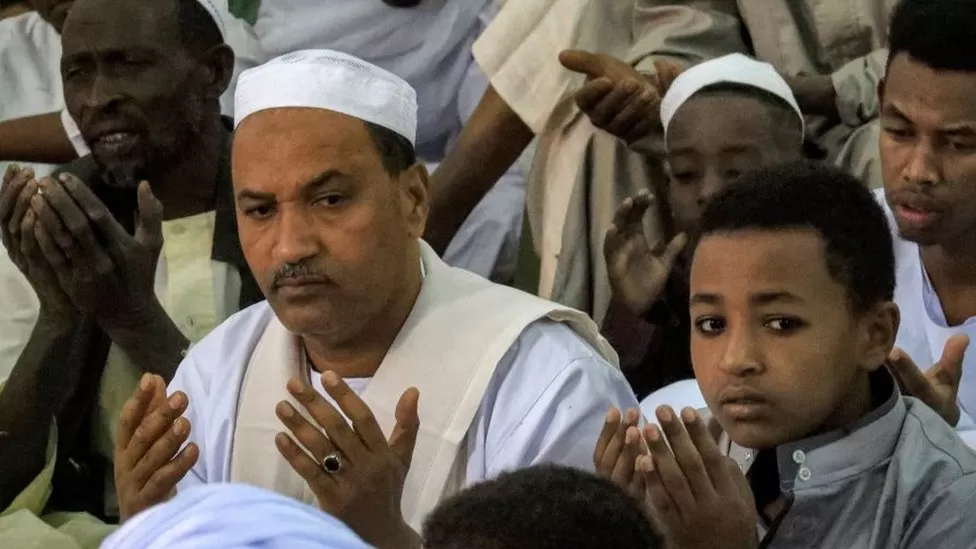

Residents of Sudan’s capital say parts of Khartoum feel like a ghost town, in stark contrast to the joyful mood usually seen during the Muslim holiday of Eid al-Fitr.
After a week of fighting between two factions of the country’s military leadership at least 400 people have been killed.
Witnesses say bombing, shelling and gunfire continue in Khartoum.
It means a three-day truce called by the UN, US and others has failed.
People in Khartoum and its twin city of Omdurman tell the BBC they are still feeling a mixture of shock and anger.
Two women crying at the entrance to a mosque explain they have lost several family members – including two children.
Eid is the Muslim festival marking the end of the fasting month of Ramadan – and Sudanese people usually relish it as a time for visiting family and eating together with their neighbours, while children play and enjoy sweets.
Prayer services would normally be packed on Eid, but on Friday many mosques in Khartoum and Omdurman are almost empty as people shelter at home.
Others meanwhile have fled the capital for their home regions.
Two previous attempted ceasefires failed to take effect.
Diplomatic pressure is being stepped up to end the fighting – with numerous countries and international bodies calling for an immediate ceasefire and offering to mediate.
At its heart, this is a power struggle between two powerful military men over the roadmap for returning the country to civilian rule.
As part of that plan the country’s current military government – made up of the army led by General Abdel Fattah al-Burhan and the paramilitary Rapid Support Forces, led by Mohamed Hamdan “Hemedti” Dagalo – were supposed to merge their forces.
But the RSF has resisted this change, and began to mobilize its troops which escalated into full-blown fighting between the two sides on Saturday.
The UN has warned that between 10,000 and 20,000 people – mostly women and children – have fled Sudan, to seek safety in neighbouring Chad.
US Secretary of State Antony Blinken on Thursday appealed to the warring military leaders separately to join a ceasefire at least until Sunday – warning of the risk to civilians as well as humanitarian and diplomatic workers.
A Sudanese army statement said Gen Burhan had received calls from the Turkish, South Sudanese and Ethiopian leaders, as well as Mr Blinken and the Saudi and Qatari foreign ministers.
The two men at the centre of the crisis – Gen Burhan and Mr Hemedti – both served under the previous president, Omar al-Bashir, until they turned on him in 2019, after months of pro-democracy protests.
They have large numbers of troops at their disposal. Gen Burhan has the regular military – around 120,000 strong – while the RSF has as many as 150,000, with a fearsome reputation for violence.
They were part of a transitional administration that was supposed to pave the way for a democratic government.
But in 2021 Gen Burhan staged a military coup, putting all that on hold.
BBC/Taiwo Akinola
Subscribe to our Telegram and YouTube Channels also join our Whatsapp Update Group